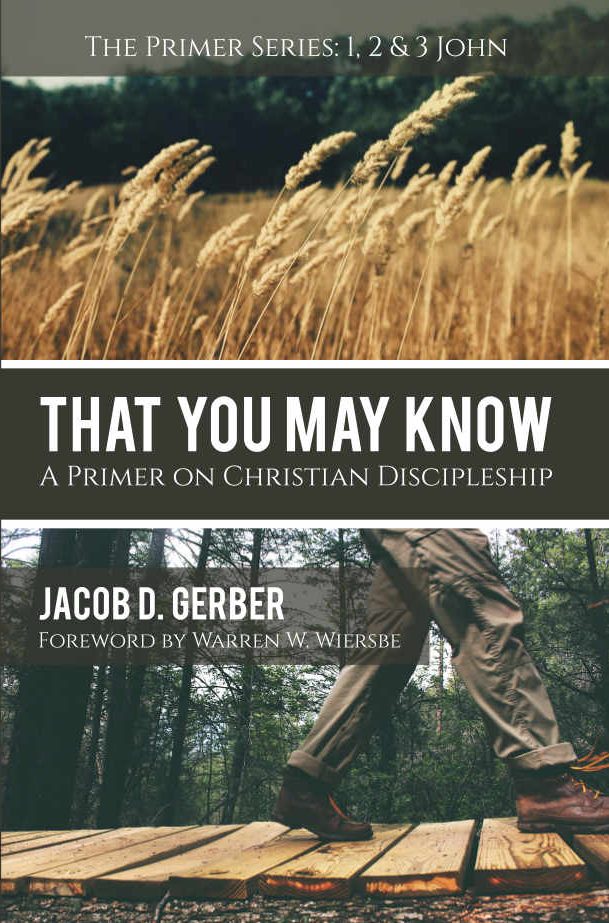Books

While there are many books written about Christian discipleship, there are not nearly enough books on discipleship that primarily expound the Bible itself. The Apostle John wrote three letters, however, with the main purpose of helping disciples to grow.
That You May Know: A Primer on Christian Discipleship is an enriching study that will lead you through John’s teaching on following Jesus as a disciple.
This book is more than a commentary and more than a topical book on the subject of Christian discipleship. Instead, this is a primer on Christian discipleship written as a careful reading of God’s word in 1, 2 & 3 John. It’s ideal for your own individual devotional reading or as a helpful resource for your group Bible study.
Download the First Two Chapters of That You May Know for Free
Bible Studies: Paul's Letter to the Philippians
Studies from my forthcoming pastoral commentary on Paul’s Letter to the Philippians, Have This Mind: A Primer on the Cruciform Life.
Access the complete set of Bible studies from Philippians here.
Philippians 2:1–11: Humility
Our model of humility for the cruciform mind comes from the One who emptied himself in order to take the form of a servant on his way to the cross. (Exposition of Philippians 2:1–11)
Philippians 1:19–30: Confidence
In the midst of uncertainties, turmoil, suffering—and the looming shadow of death some day—how does the Christian stand firm in confidence? (Exposition of Philippians 1:19–30)
Philippians 1:12–18: Joy
What is the source of the Christian’s joy? Not circumstances, but the progress of the gospel. (Exposition of Philippians 1:12–18)
Philippians 1:1–11: Fellowship
God created human beings not simply for relationships, but for fellowship—that is, spiritual commonality in Christ. (Exposition of Philippians 1:1–11)
Introduction: Have This Mind: A Primer on the Cruciform Life (Philippians)
Read the introduction for my forthcoming pastoral commentary on Paul’s letter to the Philippians: Have This Mind: A Primer on the Cruciform Life.
Bible Studies: The Gospel of John
Access the complete set of Bible studies from the Gospel of John here.
John 18:28–40: The Trial of Jesus
The world’s curse does not diminish Jesus. Jesus can take the curse of the world because his kingship is not of the world. (Exposition of John 18:28–40)
John 18:1–27: The Betrayal of Jesus
We have learned much about Jesus from his signs and his teaching, but Jesus most fully reveals his true identity at the cross. (Exposition of John 18:1–27)
John 17:20–26: The Church of Jesus
As Jesus goes to the cross, he prays for true unity in his church: Jesus intercedes for the unity of his church in the gospel. (Exposition of John 17:20–26)
John 17:6–19: The Sanctification of Jesus
After praying for his own glorification, Jesus prays for his disciples. Here, Jesus intercedes for the sanctity of his people. (Exposition of John 17:6–19)
John 17:1–5: The Prayer of Jesus
In the High Priestly Prayer, Jesus intercedes for the full acceptance of his sacrifice. In v. 1–5, Jesus prays for himself. (Exposition of John 17:1–5)
John 16:16–33: The Victory of Jesus
Jesus promises us that neither his sorrow nor our sorrow will be in vain. At the sorrow of the cross, Jesus brings forth joy. (Exposition of John 16:16–33)
Bible Studies: The Book of Genesis
Access the complete set of Bible studies from Genesis here.
Genesis 45:1–15: God Sent Me, Not You
How can Joseph forgive his brothers after all the evil they have done? Where has God been through all of this? In the midst of evil, God accomplishes good. (Exposition on Genesis 45:1–15)
Genesis 44:1–34: God Has Found Out Our Guilt
The testing of Joseph’s brothers surfaces their past sins and the iniquity of their hearts. In doing so, God leads them to repentance and salvation. God finds our sin, so that we may find Christ. (Exposition of Genesis 44:1–34)
Genesis 43:1–34: The Mercy of God Almighty
In Genesis 43, God providentially forces his people to confront fear, sin, and forgiveness, because God is setting right all that has gone wrong with the world. (Exposition of Genesis 43:1–34)
Genesis 42:1–38: What is this that God has Done?
The process of reconciling Joseph and his family must accomplish much spiritual work in the lives of God’s people. The Lord tests his people to confront their sins and to overcome their fears. (Exposition of Genesis 42:1–38)
Genesis 41:37–57: Fruitfulness through Affliction
Joseph’s eventual exaltation does not minimize his suffering, but it gives his suffering important context for understanding God’s wisdom. God gives fruitfulness through our affliction. (Exposition of Genesis 41:37–57)
Genesis 41:1–36: The Thing is Fixed by God
Joseph must wait two years for his deliverance, and God brings Pharaoh to the end of his wisdom. God alone gives true wisdom. (Exposition of Genesis 41:1–36)
Bible Studies: Paul's First Letter to the Corinthians
Access the current set of Bible studies from 1 Corinthians here. This series is in progress.
1 Corinthians 10:1–11:1: Do All to the Glory of God
In 1 Corinthians 10, Paul concludes his arguments about food sacrificed to idols. We must do everything to the glory of God, and for the advantage of our neighbor as imitators of Christ. (Exposition of 1 Corinthians 10:1–11:1).
1 Corinthians 8:1–9:27: Relinquishing our Rights
Holiness drives us to seek Christ in every facet of our lives. It is better to be deprived of our rights than of Christ’s reward. (Exposition of 1 Corinthians 8:1–9:27)
1 Corinthians 7:1–40: God’s Call to the Single and to the Married
In 1 Corinthians 7, Paul urges married and single people alike to live in light of looming eternity. Regardless of whether we marry in the Lord, God calls us to holy devotion to the Lord. (Exposition of 1 Corinthians 7:1–40)
1 Corinthians 6:1–20: Holy Living in the Church
Faith alone saves, but saving faith is never alone. Christianity announces that we have been set apart as holy to the Lord. In Christ, you are not now what you were once. (Exposition of 1 Corinthians 6:1–20)
1 Corinthians 5:1–13: Cleansing the Church
Church discipline is critical to preserve and protect the holiness of Christ’s church. Thus, the Lord Jesus commands excommunication to sanctify his church and to save unrepentant sinners. (Exposition of 1 Corinthians 5:1–13)
1 Corinthians 3:18–4:21: True Christian Ministry
What is the nature of true Christian ministry? How should pastors relate to congregations, and vice versa? King Jesus appoints ministers to administer the rule of his reign in his church (Exposition of 1 Corinthians 3:18–4:21)
Bible Studies: The Letters of John
Access the complete set of Bible studies from the Letters of John here.
1 John 4:7–21: Love
The love of God through the gospel of Jesus Christ transforms us by both leading us to abide in God and driving out our fear of judgment. (Exposition of 1 John 4:7–21)
1 John 4:1–6: Discernment
We are inundated with influencers. Because of this, we need desperately for God’s word to help us with our skills of discernment to distinguish between truth and error. (Exposition of 1 John 4:1–6)
1 John 3:11–24: Righteousness
The righteousness of God’s people has always attracted persecution from the world. Even so, righteous love gives us confidence before God. (Exposition of 1 John 3:11–24)
1 John 2:28–3:10: Hope
Christianity is a religion of hope. Not perpetual prosperity and comfort, nor gloom and doom, but hope—hope centered in the gospel of Jesus. (Exposition of 1 John 2:28–3:10)
1 John 2:15–27: Perseverance
We avoid loving the world by learning to love Jesus Christ more. To enable us to love Jesus, God gives us the anointing of his Holy Spirit. (Exposition of 1 John 2:15–27)
1 John 2:7–14: Growth
Faith alone saves, but saving faith is never alone. The Apostle John teaches us that true, genuine, saving faith always produces growth. (Exposition of 1 John 2:7–14)
Bible Studies: The Gospel of Luke
Access a handful of Bible studies from the Gospel of Luke here. These were studies written during the Advent season of 2018. At the moment, I do not have plans to continue working through the Gospel of Luke; however, I wanted to make these few studies available online for whomever may benefit from them.
Luke 1:1–25: The Annunciation of John the Baptist
Why should we concern ourselves with the life of Jesus, who lived so long ago? According to Luke, because Jesus fulfills and exceeds the old covenant, we may believe in him with certainty. (Exposition of Luke 1:1–25)
Bible Studies: The Book of Ecclesiastes
Access the complete set of Bible studies from the Book of Ecclesiastes here.
Ecclesiastes 7:1–14: Seeing Good in the Day of Adversity
After deconstructing what we call good in the first half of Ecclesiastes, the Preacher now teaches what is truly good—specifically, that God alone knows what is good. (Exposition of Ecclesiastes 7:1–14)
Ecclesiastes 6:1–12: Who Knows What is Good?
There is nothing good to see in this world, but we spend our lives looking for it. Even if we found the good we were looking for, we wouldn’t recognize it. God alone is good. (Exposition of Ecclesiastes 6:1–12)
Ecclesiastes 5:8–20: Occupied with Joy
With widespread public injustice in the world, and ever-increasing appetites for wealth in our hearts, how do we find lasting satisfaction in this world? God gives paradoxical joy. (Exposition of Ecclesiastes 5:8–20)
Ecclesiastes 5:1–7: Hear God, Fear God
In a rare direct reflection on our relationship with God, the Preacher impresses the importance of a fundamental religious duty before God: do not take the name of the Lord in vain. (Exposition of Ecclesiastes 5:1–7)
Ecclesiastes 3:16–4:16: Vanity in Life and in Death
In regard to God’s good gifts of justice, work, and companionship, we must have proper perspective to see that sin corrupts God’s good gifts. (Exposition of Ecclesiastes 3:16–4:16)
Ecclesiastes 3:1–15: Time and Eternity
We are prisoners of time, while God is eternal. As an embassy of his eternality in the midst of our time-bound toil, God gives Sabbath rest. (Exposition of Ecclesiastes 3:1–15)
Bible Studies: The Gospel of Matthew
Access the complete set of Bible studies from the Gospel of Matthew here.
Matthew 19:16–22: Treasure in Heaven
The Law demands more than external obedience, but it even regulates our internal desires. Therefore, lay up for yourself treasure in heaven. (Exposition of Matthew 19:16–22)
Matthew 19:13–15: “Let the Little Children Come to Me”
Jesus insists that the new covenant will be more inclusive of children than under the old covenant. Therefore, bring the little children to Jesus. (Exposition of Matthew 19:13–15)
Matthew 19:1–12: Marriage from the Beginning
While hard-hearted people have always looked for loopholes to escape the obligations of marriage, Jesus sanctifies us through faithfulness in marriage. (Exposition of Matthew 19:1–12)
Matthew 18:21–35: Forgiving Your Brother
Jesus reminds us of God’s lavish forgiveness for us and then issues a pointed command: forgive your brother from your heart. (Exposition of Matthew 18:21–35)
Matthew 18:15–20: Gaining Back Your Brother
In Matthew 18, Jesus teaches us how to love back our brothers, since Jesus administers his kingdom through the ministry of the church. (Exposition of Matthew 18:15–20)
Matthew 18:10–14: Leaving the Ninety-Nine
Jesus explains the very reason why he himself came from the Father into the world: Jesus came to seek and to save the lost. (Exposition of Matthew 18:10–14)










































